Men’s mental health is a critical yet often overlooked aspect of overall well-being. The societal expectation for men to be stoic and resilient can contribute to a reluctance in discussing or seeking help for mental health issues.
However, it is imperative to recognize that mental health knows no gender boundaries, and men too can face a myriad of challenges that impact their psychological well-being [mfn]Ogrodniczuk, J., Oliffe, J., Kuhl, D., & Gross, P. A. (2016). Men’s mental health: Spaces and places that work for men. Canadian family physician Medecin de famille canadien, 62(6), 463–464.[/mfn]. From societal pressures to perform to the stigma associated with vulnerability, men may navigate a complex landscape when it comes to their mental health.
Globally, the prevalence of mental health issues among men is a significant concern, with diverse cultural factors influencing the manifestation and acknowledgment of these challenges. Understanding the age of onset is crucial, as many mental health disorders emerge during adolescence or early adulthood, underscoring the importance of early intervention and support.
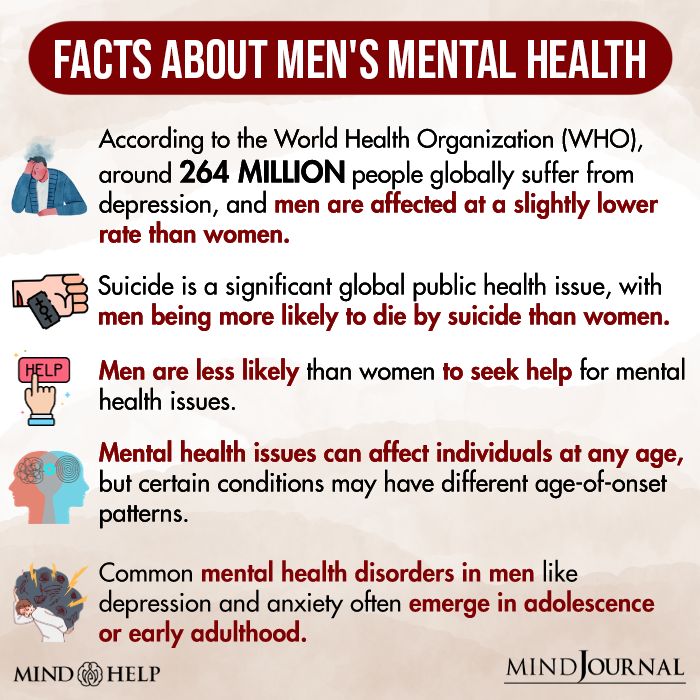
What Increases The Risk Of Mental Health Conditions In Men?
Certain factors [mfn]Affleck, W., Carmichael, V., & Whitley, R. (2018). Men’s Mental Health: Social Determinants and Implications for Services. Canadian journal of psychiatry. Revue canadienne de psychiatrie, 63(9), 581–589. https://doi.org/10.1177/0706743718762388[/mfn] increase the risk of mental health conditions in men. Young men, particularly during adolescence and early adulthood, face a critical period where many mental health disorders emerge. Pressures related to identity, peer relationships, and academic or career expectations can contribute to heightened vulnerability during this phase.
Men in high-stress occupations, such as first responders, military personnel, or executives, may be at an increased risk of mental health issues. The demanding nature of these professions can lead to elevated stress levels, impacting the overall well-being of individuals working in such environments.
Individuals dealing with chronic physical health conditions [mfn]Scott, K. M., Lim, C., Al-Hamzawi, A., Alonso, J., Bruffaerts, R., Caldas-de-Almeida, J. M., Florescu, S., de Girolamo, G., Hu, C., de Jonge, P., Kawakami, N., Medina-Mora, M. E., Moskalewicz, J., Navarro-Mateu, F., O’Neill, S., Piazza, M., Posada-Villa, J., Torres, Y., & Kessler, R. C. (2016). Association of Mental Disorders With Subsequent Chronic Physical Conditions: World Mental Health Surveys From 17 Countries. JAMA psychiatry, 73(2), 150–158. https://doi.org/10.1001/jamapsychiatry.2015.2688[/mfn] are more susceptible to mental health challenges. Additionally, men with a history of mental health disorders or a family history of such conditions may be at a higher risk, emphasizing the importance of early detection, intervention, and ongoing support.
Read More: How Men Face Abuse Often And Impact on Their Mental Health
Common Signs Of Mental Illness In Men
The common [mfn]Bilsker, D., Fogarty, A. S., & Wakefield, M. A. (2018). Critical Issues in Men’s Mental Health. Canadian journal of psychiatry. Revue canadienne de psychiatrie, 63(9), 590–596. https://doi.org/10.1177/0706743718766052[/mfn]) signs of mental illness in men include:
- Increased irritability, social withdrawal, or alterations in sleep patterns.
- Unexplained physical issues like headaches or digestive problems.
- Escalating reliance on substances, like alcohol or drugs, as a coping mechanism.
- Difficulty focusing, memory lapses, or trouble making decisions.
- Frequent and extreme mood shifts affecting daily life.
- Verbalizing feelings of hopelessness, worthlessness, or self-harm thoughts.
- Deterioration in work or academic performance.
- Disregard for personal grooming, health, or sudden weight changes.
- Social withdrawal and avoidance of friends and family.
- Decreased enthusiasm for once-enjoyed activities.
- Heightened aggression or engagement in risky actions without consideration.
Common Mental Health Issues In Men
Issues of men’s mental health can significantly impact their well-being. Conditions [mfn]Brådvik L. (2018). Suicide Risk and Mental Disorders. International journal of environmental research and public health, 15(9), 2028. https://doi.org/10.3390/ijerph15092028[/mfn] such as depression and anxiety may manifest differently in men, often presenting as irritability, social withdrawal, or an increase in risky behaviors.
Substance abuse is another prevalent challenge, with men sometimes turning to alcohol or drugs as a means of coping with emotional struggles. Additionally, men are more susceptible [mfn]Mann, S. K., & Marwaha, R. (2023, January 30). Posttraumatic Stress Disorder (PTSD). PubMed; StatPearls Publishing. https://www.ncbi.nlm.nih.gov/books/NBK559129/[/mfn] to conditions like PTSD, particularly those in high-stress occupations such as the military or first responders.
Read More About Mental Illness Here
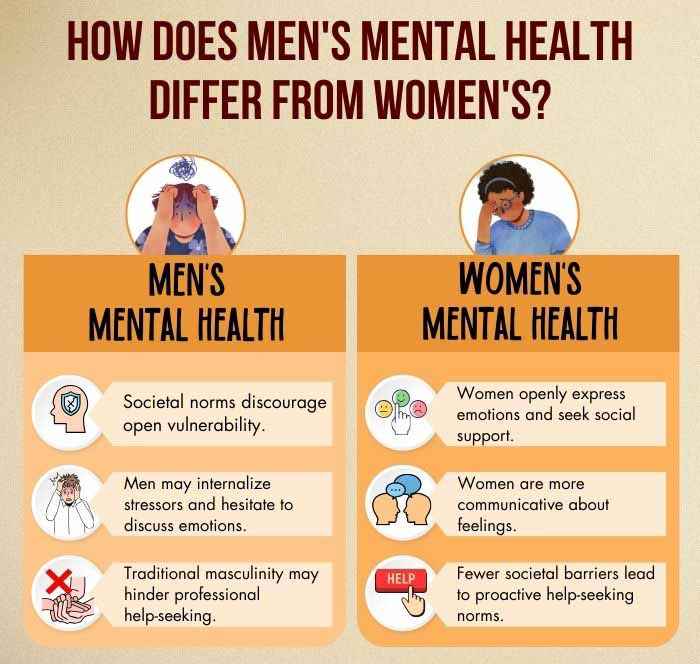
How Do Mental Health Issues In Men Impact Well-being And Daily Functioning?
Men’s mental health conditions can impact their lives in various ways, influencing behavior, relationships, and overall well-being [mfn]Shi, L., Lu, Z. A., Que, J. Y., Huang, X. L., Liu, L., Ran, M. S., Gong, Y. M., Yuan, K., Yan, W., Sun, Y. K., Shi, J., Bao, Y. P., & Lu, L. (2020). Prevalence of and Risk Factors Associated With Mental Health Symptoms Among the General Population in China During the Coronavirus Disease 2019 Pandemic. JAMA network open, 3(7), e2014053. https://doi.org/10.1001/jamanetworkopen.2020.14053[/mfn]:
1. Relationship Strain: Mental health challenges can impact communication and connection in relationships, both personal and professional.
2. Substance Abuse Risk: Some men may turn to substances as a coping mechanism, compounding mental health issues.
3. Physical Health Impact: Mental health issues can contribute to physical health problems due to the mind-body connection.
4. Suicide Risk: Men facing mental health issues are at an elevated risk of suicide, highlighting the need for early intervention.
5. Parenting Challenges: Mental health challenges can affect parenting abilities, influencing family dynamics and children’s emotional well-being.
6. Isolation Potential: Struggling with mental health may lead to social withdrawal, increasing the impact on overall well-being.
In the workplace, mental health issues in men can manifest as decreased productivity, difficulties concentrating, and increased absenteeism. This not only affects individual careers, but also harms workplace dynamics and organizational well-being. Moreover, untreated mental health issues in men can create harmful stereotypes that stigmatize mental well-being.
Is Men’s Mental Health Heavily Stigmatized?
Men’s mental health continues to face significant stigma [mfn]McKenzie, S. K., Oliffe, J. L., Black, A., & Collings, S. (2022). Men’s Experiences of Mental Illness Stigma Across the Lifespan: A Scoping Review. American journal of men’s health, 16(1), 15579883221074789. https://doi.org/10.1177/15579883221074789[/mfn], influenced by societal expectations and traditional notions of masculinity. The prevailing stereotype that men should be strong, unemotional, and self-reliant often discourages open discussions about mental health struggles.
This stigma can lead to a reluctance among men to seek help or share their emotional challenges. This stance perpetuates misconceptions around the risk of mental health conditions in men and considers acknowledging mental health issues a sign of weakness.
The Importance Of Men’s Mental Health Awareness
Men’s mental health awareness is crucial for dismantling stereotypes [mfn]Smith, D. T., Mouzon, D. M., & Elliott, M. (2018). Reviewing the Assumptions About Men’s Mental Health: An Exploration of the Gender Binary. American journal of men’s health, 12(1), 78–89. https://doi.org/10.1177/1557988316630953[/mfn], reducing stigma, and fostering an environment where open conversations about emotional well-being are encouraged. By promoting men’s mental health awareness, we empower individuals to recognize the signs of mental health challenges in themselves and others, facilitating early intervention and support.
This men’s mental health awareness also contributes to a broader cultural shift, challenging traditional norms and emphasizing that seeking help is a sign of strength. Through education and dialogue, men’s mental health awareness plays a vital role in creating a more empathetic and understanding society, where everyone feels supported in their journey toward mental well-being.
Read More About Mental Health Awareness Here
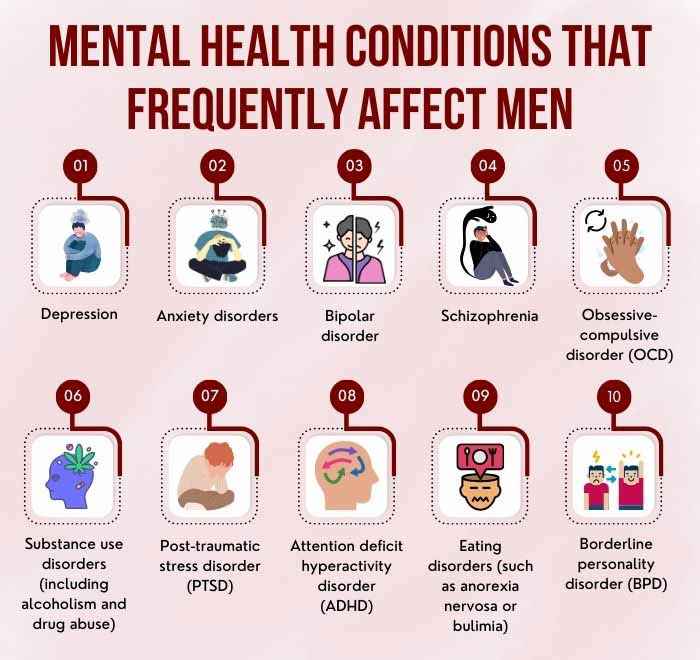
How Can Men’s Mental Health Issues Be Effectively Managed?
The signs of mental illness in men can be effectively managed by a combination of tailored interventions [mfn]Sagar-Ouriaghli, I., Godfrey, E., Bridge, L., Meade, L., & Brown, J. S. L. (2019). Improving Mental Health Service Utilization Among Men: A Systematic Review and Synthesis of Behavior Change Techniques Within Interventions Targeting Help-Seeking. American journal of men’s health, 13(3), 1557988319857009. https://doi.org/10.1177/1557988319857009[/mfn] considering factors like age, background, and mental health issues:
- Therapy: Engage in psychotherapy to explore and address underlying causes, building coping strategies.
- Medication: Use prescribed medications alongside psychotherapy for comprehensive treatment.
- Support Groups: Join men-specific support groups for shared experiences and encouragement.
- Couples/Family Therapy: Involve significant others in therapy for improved support and communication.
How To Get Help: Men’s Mental Health Tips
Men seeking help for mental health can be extremely difficult, but certain men’s mental health tips can make the process [mfn]Seaton, C. L., Bottorff, J. L., Jones-Bricker, M., Oliffe, J. L., DeLeenheer, D., & Medhurst, K. (2017). Men’s Mental Health Promotion Interventions: A Scoping Review. American journal of men’s health, 11(6), 1823–1837. https://doi.org/10.1177/1557988317728353[/mfn] unbelievably easier:
1. Seek Professional Help:
Schedule an appointment with a mental health professional, such as a psychologist, psychiatrist, or therapist, for expert guidance.
2. Contact Mental Health Helplines:
Reach out to mental health helplines or hotlines for immediate support and resources.
3. Engage in Peer Support:
Connect with friends, family, or support groups to share experiences and receive understanding and encouragement.
4. Explore Online Resources:
Utilize online platforms that offer mental health information, self-help tools, and virtual support communities.
5. Attend Workshops Or Support Groups:
Participate in workshops or support groups focused on men’s mental health, either in-person or online, to gain insights and strategies.
6. Use Employee Assistance Programs (EAPs):
Check if the workplace offers Employee Assistance Programs that provide confidential counseling and support services.
7. Access Crisis Intervention Services:
Familiarize yourself with local crisis intervention services, including emergency hotlines and crisis response teams.
8. Explore Apps and Self-Help Tools:
Try mental health apps and self-help tools designed to provide guidance and support on various aspects of well-being.
Takeaway
Addressing men’s mental health is essential for cultivating a compassionate and supportive society. Breaking down stigma, promoting open conversations, and providing diverse avenues for help empower men to prioritize their mental well-being.
Through collective men’s mental health awareness, proactive efforts, and the incorporation of self-care practices into daily routines, we can ensure that men receive the support they need, contributing to the creation of a healthier and more resilient community.
At A Glance
- Men’s mental health is often overlooked due to societal expectations of stoicism.
- The risk of mental health conditions in men include age, high-stress occupations, and pre-existing conditions.
- Common signs of mental illness in men encompass changes in behavior, mood swings, and social withdrawal.
- Men commonly experience mental health issues such as depression, anxiety, and substance abuse.
- Mental health conditions in men can impact well-being, relationships, and work performance, often exacerbated by societal expectations.
- Men’s mental health is stigmatized, hindering open discussions and contributing to reluctance in seeking help.
- Effective management of men’s mental health involves tailored interventions like therapy, medication, and support groups.
- Men’s mental health tips include seeking professional guidance, peer support, online resources, and workplace assistance programs.
Frequently Asked Questions (FAQs)
1. Which Mental Illness Is Most Common In Men?
Depression is one of the most common mental health issues in men.
2. Why Do Men Leave Therapy?
Men may leave therapy due to societal expectations of self-reliance and stigma surrounding seeking help for mental health.
3. Why Is Men’s Mental Health Ignored?
Men’s mental health is often ignored due to traditional gender norms that discourage vulnerability and emotional expression.
4. What Causes Mood Swings In Men?
Various factors, including hormonal changes, stress, and mental health conditions, can contribute to mood swings in men.


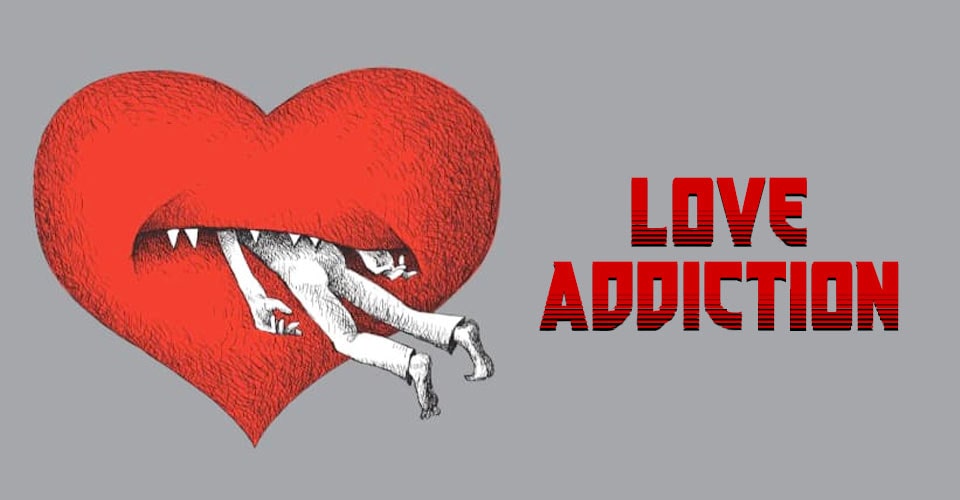
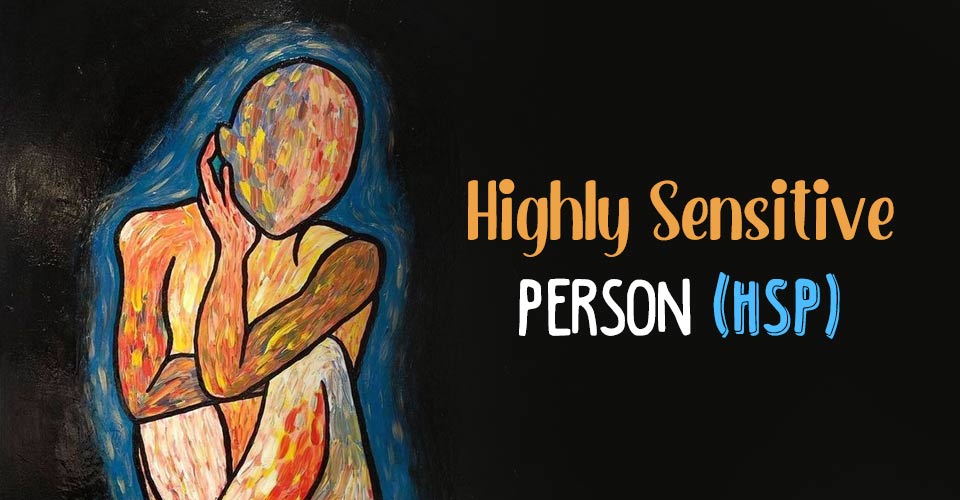





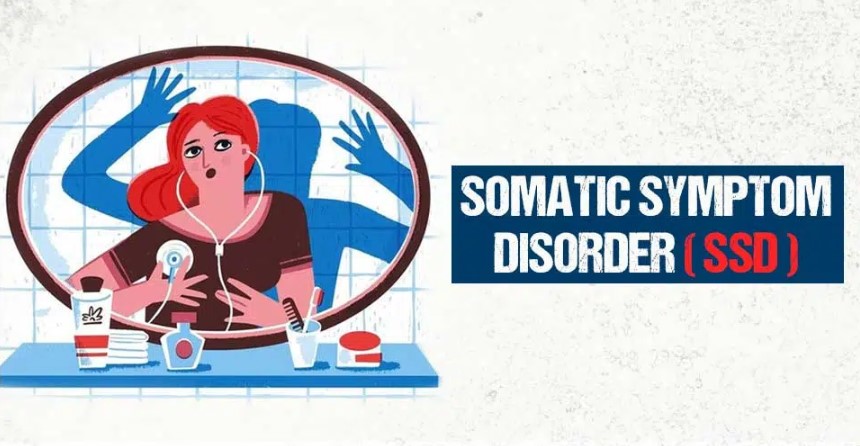

Leave a Reply